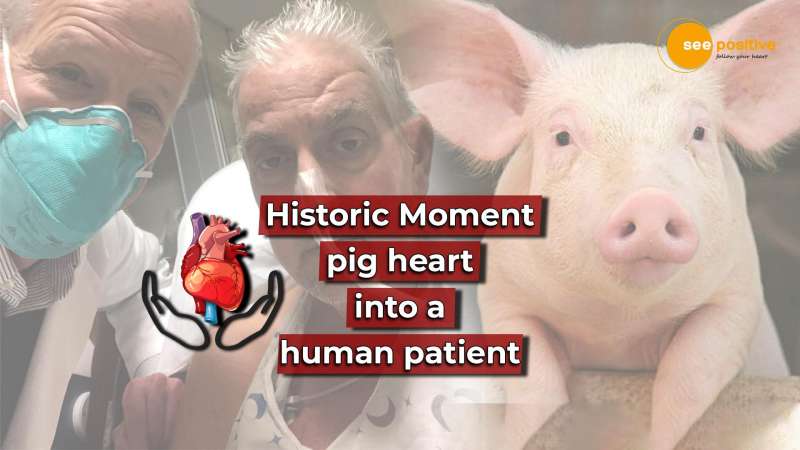

Highlights:
• In a medical first, physicians transplanted a pig heart into a patient in a last-ditch bid to save his life.
• The patient is doing well three days after the highly experimental surgery, according to a Maryland hospital.
• Dr. Muhammad Mohiuddin, scientific director of the university’s animal-to-human transplant programme, stated, “If this works, there will be an infinite supply of these organs for patients who are suffering.”
What is in the News?
While it’s too early to say whether the procedure will succeed, it’s an important step forward in the decades-long goal to one day employ animal organs for life-saving transplants.
In a medical first, physicians transplanted a pig heart into a patient in a last-ditch bid to save his life, and the patient is doing well three days after the highly experimental surgery, according to a Maryland hospital.
While it’s too early to say whether the procedure will succeed, it’s an important step forward in the decades-long goal to one day employ animal organs for life-saving transplants.
Organ Transplant
The transplant demonstrated that a heart from a genetically modified animal may function in the human body without rapid rejection, according to doctors at the University of Maryland Medical Center.
Patient, David Bennett
The patient, David Bennett, 57, was aware that the trial had no chance of success, but he was dying, ineligible for a human heart transplant, and had no other options, according to his son.
“It was either die or do this transplant,” says the patient. I’d like to live. Bennett remarked a day before the surgery, “I know it’s a gamble, but it’s my last resort,” according to a statement released by the University of Maryland School of Medicine.
Shortage of human organs
Because there is a severe shortage of human organs available for transplant, scientists are attempting to find a way to use animal organs instead. According to the United Network for Organ Sharing, which supervises the nation’s transplant system, there were just over 3,800 heart transplants in the United States last year, a record number.
Know what Dr. Muhammad Mohiuddin says
Dr. Muhammad Mohiuddin, scientific director of the university’s animal-to-human transplant programme, stated, “If this works, there will be an infinite supply of these organs for patients who are suffering.”
However, previous attempts at such transplants — known as xenotransplantation — have failed, owing to the body’s fast rejection of the animal organ. In 1984, a dying newborn named Baby Fae survived for 21 days with a baboon heart.
What is different?
The difference this time was that the Maryland surgeons utilized a heart from a pig that had been gene-edited to eliminate a sugar in its cells that causes the organ rejection to happen so quickly.
The Maryland transplant, according to Dr. David Klassen, UNOS’ senior medical officer, “may be described as a landmark event.”
Klassen emphasized, however, that this is merely a beginning step in determining whether xenotransplantation will work this time.
Who gave the approval?
The surgery was approved by the Food and Drug Administration, which oversees xenotransplantation research, under a “compassionate use” emergency authorization, which is available when a patient with a life-threatening disease has no other options.
Researchers in New York conducted an experiment last September that suggested these types of pigs could be useful for animal-to-human transplants.
Pig’s kidney transplantation
Doctors briefly implanted a pig’s kidney into the body of a deceased human and watched it function. According to Dr. Robert Montgomery, who supervised the trial at NYU Langone Health, the Maryland transplant takes their work to the next level.
Karen Maschke, a research scholar at the Hastings Center who is helping develop ethics and policy recommendations for the first clinical trials under a grant from the National Institutes of Health, said it will be critical to share the data gathered from this transplant before opening the option to more patients. IN a statement, he remarked, “This is a genuinely spectacular breakthrough.”
“As a heart transplant recipient who also has a genetic cardiac condition, I am overjoyed by this news and the hope it provides for my family and other patients who will benefit from this discovery.”


